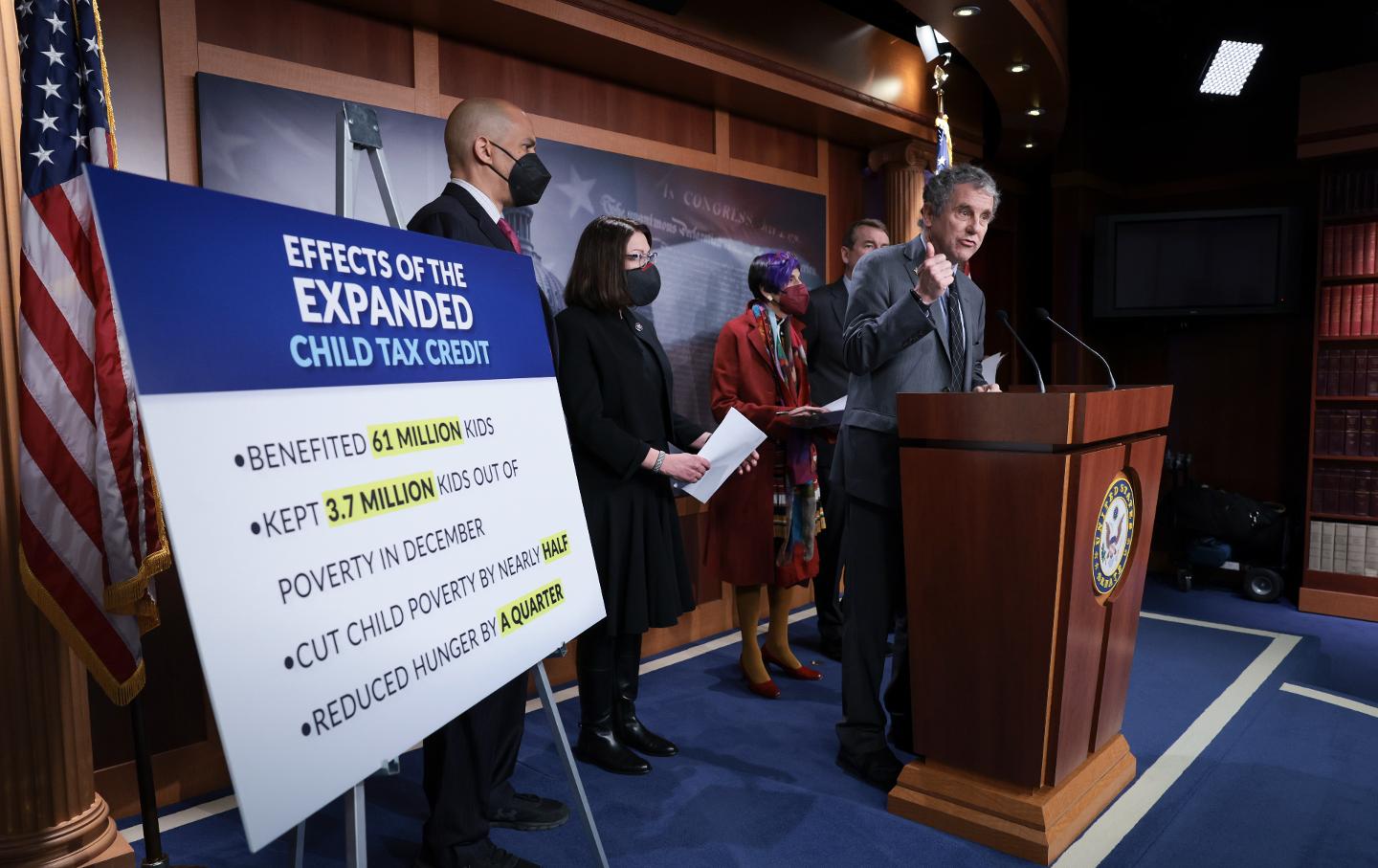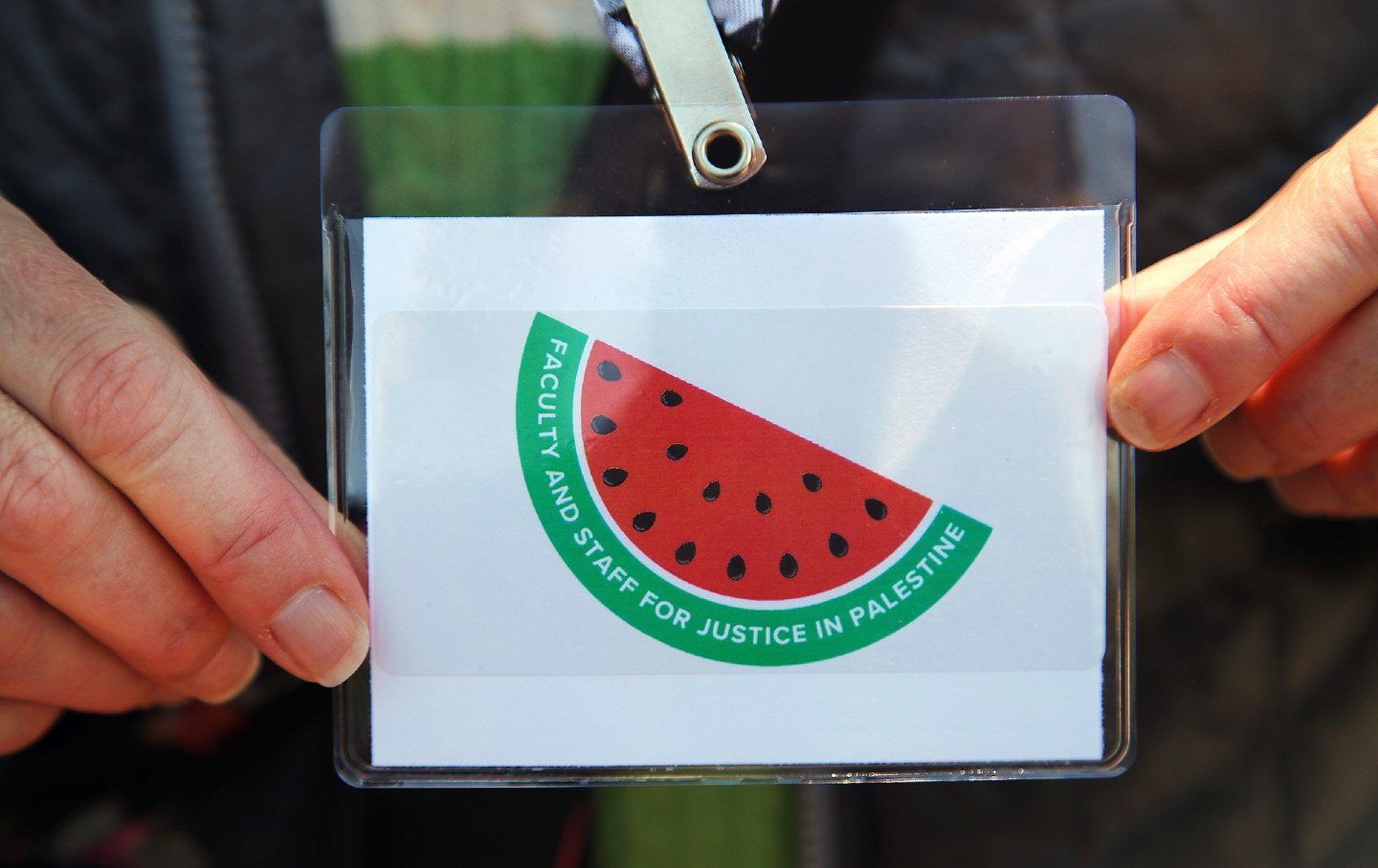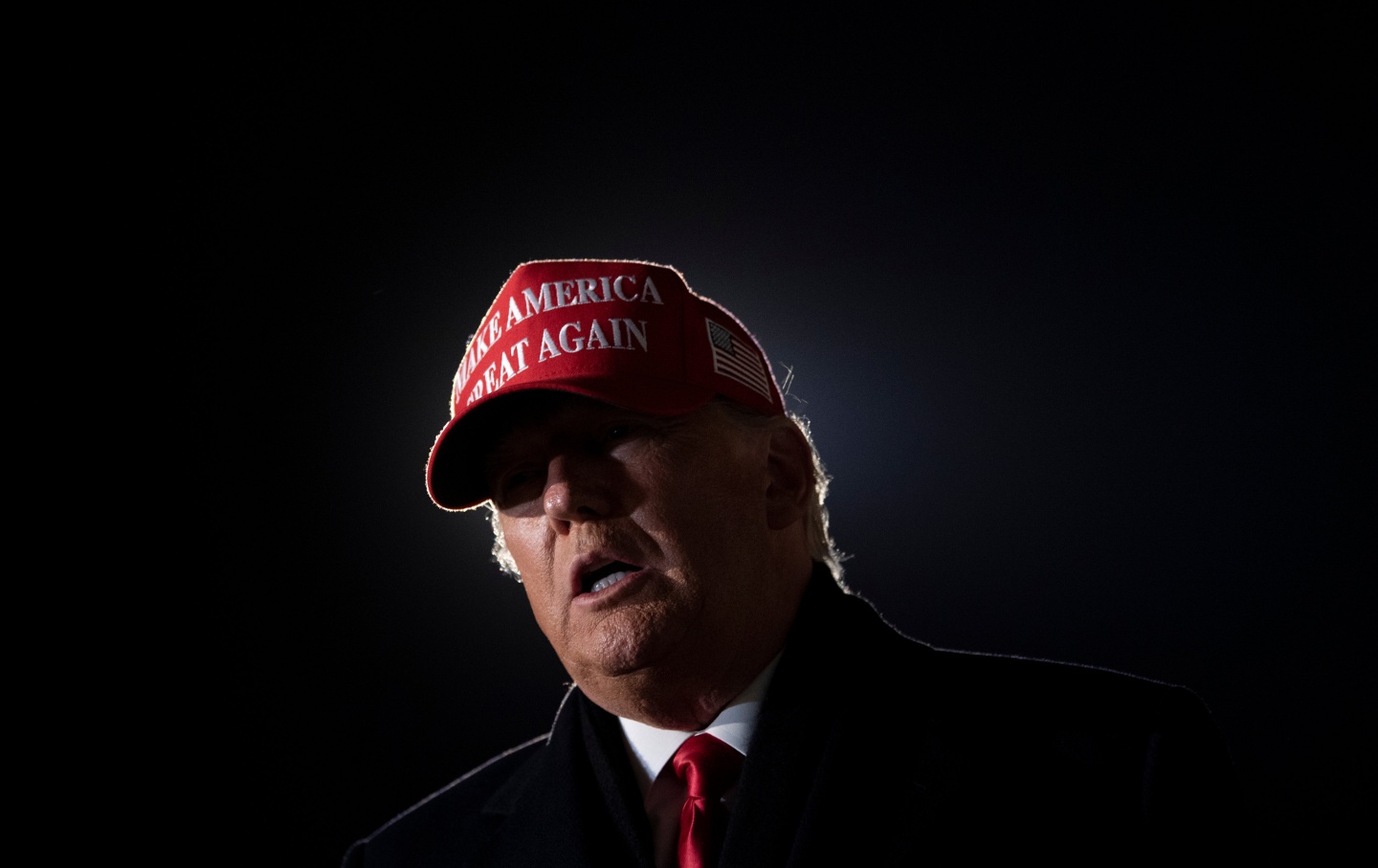We Know How to Get Good Public Health Policies. Now We Need to Figure Out How to Keep Them.
It’s not enough to come up with good ideas for our broken healthcare system. We need to create the political space to make them stick.

Senator Sherrod Brown (right) (D-Ohio) speaks during a press conference about the child tax credit on February 8, 2022.
(Win McNamee / Getty Images)In my Covid-era writing for The Nation, I’ve returned time and again to the same point: that the staggering amount of death and suffering we’ve seen in the United States was fueled not only by Covid itself but also by the injustices that were already embedded in our way of life before the virus infected a single person.
Our fragmented and rapacious care-for-profit healthcare industry; our weak public health infrastructure; our reflexive reliance on a “thousand points of light” rather than government to fulfill public need; and the pathologizing of the poor and vulnerable as the source of their own plight—all of these things meant that we were already in a severely compromised position when Covid hit. And I’ve criticized both the Trump and Biden administrations for their pandemic response, again and again.
I don’t want to keep banging this drum, but as we head toward the fourth year of our life with Covid, I feel like I have no other choice. The people in power are still doubling down on everything that brought us here. They are still outsourcing the pandemic response to the rapacious private healthcare industry. They are still implying that the Covid dead have only themselves to blame—after all, “we have the tools.” They are still insisting that the fault must not be in our stars but in ourselves, transforming an issue of public health into one of personal responsibility.
But I’ve been wondering lately about missed opportunities. If “never let a crisis go to waste” could be a motto for disaster capitalism, I’ve come to think that those of us on the left were unprepared with a broad and robust alternative that could be deployed in response to crisis and, most importantly, outlast any singular event.
Early in 2020, we all became socialists. We backstopped our economies with massive state intervention and, in the United States, built up a welfare state that was almost European, with an array of programs that in ordinary times would never have been considered, let alone passed into law.
But as Samuel Hammond, the chief economist at the Lincoln Network, a think tank that advocates for free markets, individual liberty, and limited government, told The New York Times in April: “The politics of trying to make these programs permanent just isn’t there today.”
And therein lies the rub. While many of the policies were wildly successful—for instance, the expanded child tax credit given monthly reduced child poverty by close to 30 percent—almost all of them have been phased out. President Biden tried to extend the social protections Americans enjoyed during the pandemic but failed, and what remained of his legislative agenda ended up funding corporations and building projects.
How could we have gone from a collective understanding that we needed to build out the American welfare state in a moment of crisis to jettisoning what we built in a matter of months? I think it hinges on the “politics of making these programs permanent” that Samuel Hammonds refers to above. The rest of his quote in The New York Times is instructive: “The macro environment has turned in a way that has sort of reaffirmed the fiscal conservatives.” The narrative that won the day is the old canard: We simply could not afford what we created during the pandemic.
Good policies are not enough in and of themselves. We need to create the conditions to allow these policies to survive. There are organizers and academics thinking about how we do this. People including Connie Razza, Jamila Michener, and Deepak Bhargava have talked about the necessity of building policy feedback loops in our plans for the future. In short, policy feedback loops shift the narrative—they create a strong rationale in people’s minds about any program that rolls out. There is a reason there is some bipartisan support for reviving the expanded child allowance; as one conservative put it: “Nobody wants kids to be in poverty.” But policy feedback loops also build power. They create a constituency that can defend programs from attack–think of the notion of Social Security and Medicare as the “third rail” of American politics. No politician wants to piss off the many elderly Americans who rely on these programs.
The expansion of our safety net during the first three years of the pandemic was crucial to our survival. Things would have been far worse without these temporary concessions from those in power. But the weakness of social protections in the United States made us more vulnerable to the pandemic in the first place and have devastated American life expectancy for much of our history.
As my colleague Amy Kapczynski and I wrote in the Boston Review in March 2020:
While we spend enormous amount on health care in this country, it is the weakness of our underlying system of social welfare that differentiates us from other countries with better health outcomes. The social safety net that Republicans and neoliberal Democrats love to hate is what undergirds successful health systems, and rebuilding it will be the foundation of a New Deal for Public Health.
We were right then and are right now. We’ve seen the possibilities in what transpired since we wrote that piece in the first few weeks of our pandemic present. But what we need now is to create “political space” to make this happen. This requires a different kind of conversation among public health experts, social service, and healthcare providers, political professionals, and organizers. A New Deal for Public Health is possible. We’ve got to be ready when the political opportunities arise again to advocate for policies in the context of a larger architecture of policy feedback loops. And we need to start thinking about, and building towards, that future now.
We cannot back down
We now confront a second Trump presidency.
There’s not a moment to lose. We must harness our fears, our grief, and yes, our anger, to resist the dangerous policies Donald Trump will unleash on our country. We rededicate ourselves to our role as journalists and writers of principle and conscience.
Today, we also steel ourselves for the fight ahead. It will demand a fearless spirit, an informed mind, wise analysis, and humane resistance. We face the enactment of Project 2025, a far-right supreme court, political authoritarianism, increasing inequality and record homelessness, a looming climate crisis, and conflicts abroad. The Nation will expose and propose, nurture investigative reporting, and stand together as a community to keep hope and possibility alive. The Nation’s work will continue—as it has in good and not-so-good times—to develop alternative ideas and visions, to deepen our mission of truth-telling and deep reporting, and to further solidarity in a nation divided.
Armed with a remarkable 160 years of bold, independent journalism, our mandate today remains the same as when abolitionists first founded The Nation—to uphold the principles of democracy and freedom, serve as a beacon through the darkest days of resistance, and to envision and struggle for a brighter future.
The day is dark, the forces arrayed are tenacious, but as the late Nation editorial board member Toni Morrison wrote “No! This is precisely the time when artists go to work. There is no time for despair, no place for self-pity, no need for silence, no room for fear. We speak, we write, we do language. That is how civilizations heal.”
I urge you to stand with The Nation and donate today.
Onwards,
Katrina vanden Heuvel
Editorial Director and Publisher, The Nation
More from The Nation

Sundays With Noel Sundays With Noel
Noel Parmentel was, according to his former lover and mentee, Joan Didion, the ‘outsider who lived by his ability to manipulate the inside.’

Bosses Are Retaliating Against Workers for Showing Solidarity With Palestinians Bosses Are Retaliating Against Workers for Showing Solidarity With Palestinians
Workers are losing their jobs and professional opportunities for expressing pro-Palestinian sentiment. Others are choosing to self-censor amid a climate of fear.

When It Comes to Public Health, We Need to Tap Into People, Not Pundits When It Comes to Public Health, We Need to Tap Into People, Not Pundits
The future of our health under Trump is going to be bleak. But the solution lies in our communities, not individual personalities.

Mr. Scarborough Goes to Mar-a-Lago Mr. Scarborough Goes to Mar-a-Lago
The hosts of Joe Biden’s favorite political talk show have quickly pivoted to kissing the ring of the incoming president.

Watching a Parallel Media Try to Make Trump the Big Sports Story Watching a Parallel Media Try to Make Trump the Big Sports Story
The president-elect did not dominate the world of sports this weekend, but Fox News and Internet tabloids are inventing new realities.

The First Amendment Will Suffer Under Trump The First Amendment Will Suffer Under Trump
Given what’s heading our way, we need a capacious view and robust defense of the First Amendment from all quarters.


